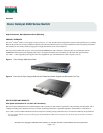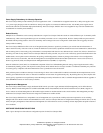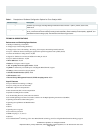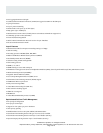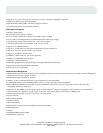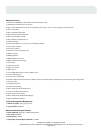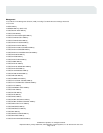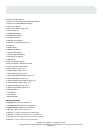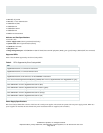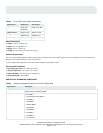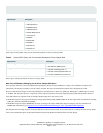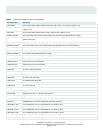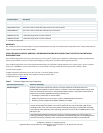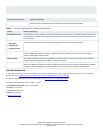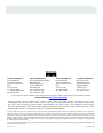
© 2006 Cisco Systems, Inc. All rights reserved.
Important notices, privacy statements, and trademarks of Cisco Systems, Inc. can be found on cisco.com.
Page 4 of 16
• Port Aggregation Protocol (PAgP)
• Unidirectional Link Detection Protocol (UDLD) and aggressive UDLD on the SFP ports
• Q-in-Q in hardware
• Layer 2 protocol tunneling
• Jumbo frames on all ports (up to 9216 bytes)
• Baby giants (up to 1600 bytes)
• Hardware-based storm control (formally known as broadcast and multicast suppression)
• Community private VLANs (PVLANs)
• Forced 10/100 autonegotiation
• Web Content Communication Protocol Version 2 Layer 2 Redirect
• Private VLAN Promiscuous Trunk
Layer 3 Features
• Hardware-based IP Cisco Express Forwarding routing at 72 Mpps
• Static IP routing
• IP routing protocols: EIGRP, OSPF, RIP, RIP2
• BGPv4 and Multicast Border Gateway Protocol (MBGP)
• Hot Standby Router Protocol (HSRP)
• Software routing of IPX and AppleTalk
• IS-IS routing protocol
• IGMPv1, v2, and v3
• IGMP filtering on access and trunk ports
• IP Multicast routing protocols (Protocol Independent Multicast [PIM], Source Specific Multicast [S SM], and Distance Vector
• Multicast Routing Protocol [DVMRP])
• Pragmatic General Multicast (PGM)
• Cisco Group Management Protocol (GMP) server
• Full Internet Control Message Protocol (ICMP) support
• ICMP Router Discovery Protocol
• Policy-based routing (PBR)
• Virtual Route Forwarding-lite (VRF-lite)
• IPv6 software switching support
• OSPF fast convergence
• EIGRP stub
• Virtual Router Redundancy Protocol (VRRP)
Sophisticated QoS and Traffic Management
• Per-port QoS configuration
• Per-port per VLAN QoS
• Support for four queues per port in hardware
• Strict priority queuing
• IP differentiated services code point (DSCP) and IP Precedence
• Classification and marking based on IP type of service (ToS) or DSCP
• Classification and marking based on full Layer 3 and 4 headers (IP only)
• Input and output policing based on Layer 3 and 4 headers (IP only)



